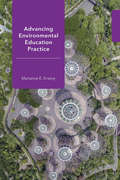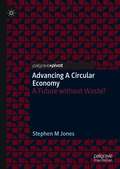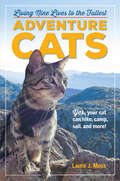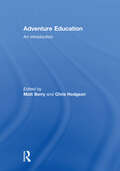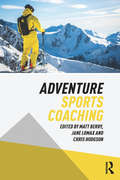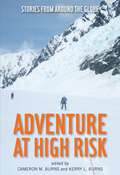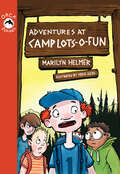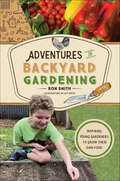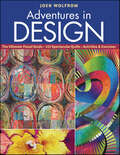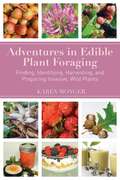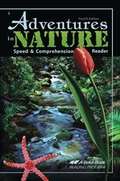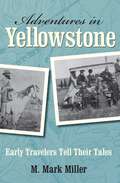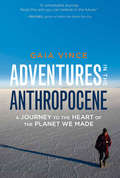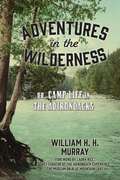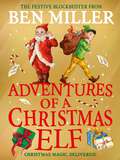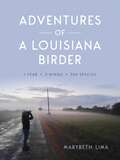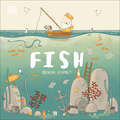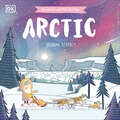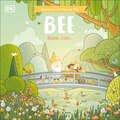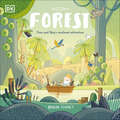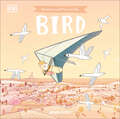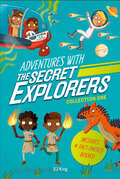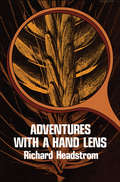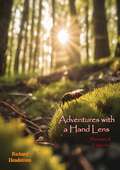- Table View
- List View
Advancing Environmental Education Practice (Cornell Series in Environmental Education)
by Marianne E. KrasnyIn this important intervention, change-agent Marianne E. Krasny challenges the knowledge-attitudes-behavior pathway that underpins much of environmental education practice; i.e., the assumption that environmental knowledge and attitudes lead to environmental behaviors. Krasny shows that certain types of knowledge are more likely than others to influence behaviors, and that generally it is more effective to work with existing attitudes than to try to change them. The chapters expand the purview of potential outcomes of environmental education beyond knowledge and attitudes to include nature connectedness, sense of place, efficacy, identity, norms, social capital, youth assets, and individual wellbeing.Advancing Environmental Education Practice also shows how, by constructing theories of change for their environmental education programs, environmental educators can target specific intermediate outcomes likely to lead to environmental behaviors and collective action, and plan activities to achieve those intermediate outcomes. In some cases, directly engaging program participants in the desired behavior or collective action can lead to changes in efficacy, sense of place, and other intermediate outcomes, which in turn foster future environmental actions. Finally, Advancing Environmental Education Practice shares twenty-four surveys that assess changes in environmental behaviors and intermediate outcomes, and provides guidelines for qualitative evaluations.Thanks to generous funding from the Cornell Department of Natural Resources, the ebook editions of this book are available as Open Access volumes from Cornell Open (cornellopen.org) and other Open Access repositories.
Advancing Land Change Modeling: Opportunities and Research Requirements
by Committee on Needs Research Requirements for Land Change ModelingPeople are constantly changing the land surface through construction, agriculture, energy production, and other activities. Changes both in how land is used by people (land use) and in the vegetation, rock, buildings, and other physical material that cover the Earth's surface (land cover) can be described and future land change can be projected using land-change models (LCMs). LCMs are a key means for understanding how humans are reshaping the Earth's surface in the past and present, for forecasting future landscape conditions, and for developing policies to manage our use of resources and the environment at scales ranging from an individual parcel of land in a city to vast expanses of forests around the world. "Advancing Land Change Modeling: Opportunities and Research Requirements" describes various LCM approaches, suggests guidance for their appropriate application, and makes recommendations to improve the integration of observation strategies into the models. This report provides a summary and evaluation of several modeling approaches, and their theoretical and empirical underpinnings, relative to complex land-change dynamics and processes, and identifies several opportunities for further advancing the science, data, and cyberinfrastructure involved in the LCM enterprise. Because of the numerous models available, the report focuses on describing the categories of approaches used along with selected examples, rather than providing a review of specific models. Additionally, because all modeling approaches have relative strengths and weaknesses, the report compares these relative to different purposes. "Advancing Land Change Modeling's" recommendations for assessment of future data and research needs will enable model outputs to better assist the science, policy, and decisionsupport communities.
Advancing a Circular Economy: A Future without Waste?
by Stephen M JonesThis book explores an escalating modern-day crisis; managing waste in a sustainable way. The central question posed is whether advancing a circular economy provides a way to shift waste management practices towards more sustainable approaches. It begins with an in-depth analysis of the nature of waste management and the prevailing crisis, followed by a discussion about the circular economy in terms of its requirements and the challenges of implementation. The book then moves on to propose a framework that sets out how to establish the policy changes needed to advance a circular approach to waste management. Next, the book outlines complex issues in multilevel systems for advancing a circular economy through examining the contemporary situation in Belgium and Norway. It ends by bringing together the issues revealed in these case studies and draws insights for governments advocating circular approaches. The book will be a valuable resource to scholars, students, practitioners and policy makers interested in developing more sustainable methods of waste management.
Adventure Cats: Living Nine Lives to the Fullest
by Laura J. MossJust when you thought you knew all there was to know about cats comes the ultimate—and unexpected—guide to taking your cat into the wild. Here are cats walking on a leash. Cats hiking on a leash. Cats tramping through snow. Cats camping. Cats kayaking, canoeing, even surfing—yes, cats who love water. When animal writer and active hiker Laura Moss couldn’t find an online resource for hitting the trail with her cat, she created one. AdventureCats.org took off like wildfire, with attention from Wired, the Huffington Post, Outside magazine, BuzzFeed, and much more. Now, the book Adventure Cats—a collection of jaw-dropping photographs, inspiring stories of real-life cats, and all the how-to a cat owner needs—will take readers and their cats well beyond the backyard. Learn how to leash-train a cat. What to do if you encounter wildlife on the trail. Plus, winter safety tips, and how to bring a little bit of the outdoors to an indoor cat. The stories themselves are catnip for animal lovers, from Nanakuli, the one-eyed cat who hangs ten; to Georgie, a four-year-old gray tabby who lives on a sailboat; to Quandary, who not only insists on hiking with her family but also teaches them a valuable lesson: When you follow your cat’s natural tendency to wander, you experience the outdoors at a slower, richer pace. This book will delight every cat person, regardless of whether their pet is inclined to adventure. (Take the quiz at the beginning of the book to find out!)
Adventure Education: An Introduction
by Matt Berry and Chris HodgsonAdventure Education is a form of experiential learning typically associated with activities involving risk, from cooperative games such as raft building to high adventure activities such as rock climbing. Adventure Education: An Introduction provides a comprehensive introduction to the planning, delivery and evaluation of Adventure Education, with a strong emphasis on professional practice and delivery. Written by a team of leading Adventure Educators who can draw upon an extensive experience base, the book explores the most important strategies for teaching, learning and implementation in Adventure Education. The book is fully illustrated throughout with real-world case studies and research surveying the key contemporary issues facing Adventure Education Practitioners. This includes essentials for the adventure educator such as risk management and tailoring activities to meet specific learning needs, as well as providing an insight into contemporary uses for adventure programmes. With outdoor and adventure activities being more popular than ever before, this book is essential reading for any student, teacher or practitioner looking to understand Adventure Education and develop their professional skills.
Adventure Sports Coaching
by Chris Hodgson Matt Berry Jane LomaxCoaching adventure sports is part of the core work of many adventure educators but has been largely neglected in the adventure studies literature. This is the first book to link contemporary sports coaching science with adventure sports practice. It examines the unique set of challenges faced by adventure sports coaches, such as the dynamic natural environment and the requirement to train athletes to levels of high performance outside of traditional structures of competition, and explores both key theory and best practice. The book covers key topics such as: Skill acquisition and skill development Models of learning and teaching Performance analysis Tactics and decision-making Training principles Mental skills techniques Goal setting and progression Risk management Each chapter contains applied examples from a range of adventure sports, including mountaineering, rock climbing, canoeing, kayaking, surfing, and winter sport, as well as practical coaching techniques and a guide to further reading. Written by a team of authors with wide experience of coaching, teaching, researching and high performance participation in adventure sports, this book is invaluable reading for any student or practitioner with an interest in adventure, outdoor education, sports coaching or lifestyle sport.
Adventure at High Risk: Stories from Around the Globe
by Cameron Burns Kerry BurnsA collection of some of the world’s greatest adventures Anyone with a thirst for adventure and a courageous spirit will be captivated by the tales of endurance, determination, strength of mind, and perseverance recounted in this outstanding compilation. The stories in this book, be they fact or fiction, represent some of the most gripping and illuminating writing ever penned on the subject of adventure from across the globe. From straightforward narratives to spiritual reveries, adventure prompts men and women to pour forth essays, articles, and books that are unlike any other field of literature. Editors Kerry L. Burns and Cameron M. Burns showcase the amazingly vast spectrum that adventure literature offers.With contributions by:Matt GerdesLinus Lawrence PlattRobyn DavidsonJon TurkCameron M. BurnsDoug PeacockPeter McBrideStephen VenablesRoger W. BruckerRichard A. WatsonChris DavenportJonathan WatermanJohn AckermanDean CummingsChristina DodwellEdmund Stump
Adventures at Camp Lots-o-Fun (Orca Echoes)
by Marilyn HelmerBad weather, bugs and boredom—DJ and the boys in Camp Lots-o-Fun's cabin six are starting to call it Camp Not-so-Fun. To make matters worse, one of the boys has it in for DJ. But DJ isn't about to let that bother him. His lively imagination and wit ensure there's never a dull moment. A bear in the woods, monsters in the lake and a hermit's ghost make for a week at summer camp that none of the boys in cabin six will soon forget.
Adventures in Backyard Gardening: Inspiring Young Gardeners to Grow Their Own Food (The Adventures Series)
by Ron SmithAuthor is a Environmental Science Educator, Citizen/Community Science Project Leader, and Curriculum Writer The health of the planet and of humanity is connected to food. Where our food comes from matters. How our food is grown matters. The diversity of our food matters. With so many educational initiatives, if kids learn early, it becomes an enduring part of their lives.
Adventures in Design: The Ultimate Visual Guide, 153 Spectacular Quilts, Activities & Exercises
by Joen WolfromBring more beauty and balance to your quilt designs • Everything you need to know about the essentials of good design from an internationally reknowned expert • Learn about the key elements of design and how to apply strategies for success • Practice what you've learned with exercises at the end of each chapter • An inspiring gallery illustrates design concepts by many prominent quilters and artists - including Alex Anderson, Paula Nadelstern, and Ricky Tims - with over 150 images showcasing all styles of quilts and fabric art, from traditional to modern This is the design textbook for quilters. Joen presents the eight elements of design: line, direction, shape, color, value, texture, proportion, and scale. You'll learn how to work with these elements using many guiding design principles, such as unity and balance. Whether you consider yourself to be a quilter, an artist, or a crafter, you can improve your design skills by exploring Joen's fresh, innovative approach.
Adventures in Edible Plant Foraging: Finding, Identifying, Harvesting, and Preparing Native and Invasive Wild Plants
by Karen MongerPurchasing vegetables and leafy greens can become rather pricy. Moreover store-bought greens often contain unhealthy pesticides and chemicals that can be harmful to your health. Foraging for wild plants is a cost effective and healthy alternative. Harvested wild plants are cheaper, and much healthier with a significantly higher nutritional value than what you typically purchase in grocery stores contain. On top of that, harvesting your own plants will force you to get out, exercise, and explore the great outdoors, which is an excellent way to stay fit and spend time with your family. Written with novice foragers in mind, Adventures in Edible Plant Foraging, serves as a simplified guide to edible plants that can be found throughout North America, and includes a glossary of botanical terms. This all encompassing guide will teach you how to prepare for your first foray into foraging--what to bring and what to watch out for--and show you how to identify various edible wild plants native to your own backyard, the forest, fields and the sandy shores along lakes and beaches. With over 90 full color photographs and 20 recipes for soups, salads, muffins, desserts, and more, this book is a must have for anyone looking to save money and begin their first expedition into foraging.
Adventures in Nature: Speed and Comprehensive Reader
by Marion Hedquist Michelle Johnson Dawn Mereness Phyllis RandBeginning in fourth grade, the reading program provides specific opportunities for students to develop comprehension skills. At this level, students are responsible for much more history and science material and outside reading. Their vocabulary work is increased, and they are expected to retain many more facts. Begin now to stress the importance of reading for information at the best possible speed. Because the reading program for the lower elementary grades stresses phonics and reading mastery, students are now ready to work on these other reading skills.
Adventures in Yellowstone: Early Travelers Tell Their Tales
by M. Mark MillerAfter its establishment in 1872, Yellowstone National Park was sufficiently famous that numerous people risked bear maulings, Indian attacks, and geyser burns just to glimpse its wonders. A surprising number of those who survived wrote about their adventures. The best of these stories are collected in Adventures in Yellowstone. Presenting a dozen narratives—journal entries, letters, and diaries—with an introduction to each, and with historic photographs, postcards, and woodcuts, this book is the essential compilation of the most gripping first-person accounts of the early years of America&’s most cherished national park.
Adventures in the Anthropocene: A Journey to the Heart of the Planet We Made (Patterns Of The Planet Ser.)
by Gaia VinceWe all know our planet is in crisis, and that it is largely our fault. But all too often the full picture of change is obstructed by dense data sets and particular catastrophes. Struggling with this obscurity in her role as an editor at Nature, Gaia Vince decided to travel the world and see for herself what life is really like for people on the frontline of this new reality. What she found was a number people doing the most extraordinary things.During her journey she finds a man who is making artificial glaciers in Nepal along with an individual who is painting mountains white to attract snowfall; take the electrified reefs of the Maldives; or the man who's making islands out of rubbish in the Caribbean. These are ordinary people who are solving severe crises in crazy, ingenious, effective ways. While Vince does not mince words regarding the challenging position our species is in, these wonderful stories, combined with the new science that underpins Gaia's expertise and research, make for a persuasive, illuminating - and strangely hopeful - read on what the Anthropocene means for our future.
Adventures in the Wilderness: Or, Camp Life in the Adirondacks
by W. H.H. MurrayKnown as the &“Father of the Outdoor Movement,&” William HH Murray&’s writings have been appreciated by generations of readers looking to nature as an escape from our daily lives as well as a portal to our past, perhaps none more so than his classic Adventures in the Wilderness: Or, Camp-Life in the Adirondacks. Published in 1869 and widely hailed as the first book on recreational camping ever published in America, this groundbreaking resource informed readers how to live in the woods: what equipment to bring, where to set up camp, how to cook, fish, and hunt, and most importantly insights on the profound connections to be made between humankind and the outdoor world around us. Besides introducing readers to the great outdoors, the book would go on to lay the foundation for the conservation movement. With a Foreword by Laura Rice, the Chief Curator of the Adirondack Experience Museum, this edition of Adventures in the Wilderness revisits Murray&’s timeless tips and stories of north country camping with modern-day context and clarity, showing that the profound power of nature has only grown.
Adventures of a Christmas Elf: The perfect festive family gift from Chief Elf and million-copy selling Ben Miller (Christmas Elf Chronicles #3)
by Ben MillerDiscover the joy of gift giving and meet Santa himself in the perfect stocking filler from the million-copy selling actor, author and comedian, Ben Miller.'Wonderful, funny, magical' Chris Evans'Bubbles with warmth and mischievous humour . . . irresistible' Alexander Armstrong Father Christmas needs a holiday. He isn't feeling well and someone seems determined to ruin the festivities. It's up to Christmas Elves, Tog and Holly, to find a way to deliver the presents on time and bring the Christmas magic back for everyone. A laugh-out-loud race against time from Ben Miller! Discover the magic of life as a Christmas Elf in all three laugh-out-loud stories that will take you round the world on Santa&’s sleigh, including Diary of a Christmas Elf and Secrets of a Christmas Elf. Create the perfect festive bookshelf for all the family with Chief Elf, Ben Miller: Meet Santa himself in The Night I Met Father Christmas, a brand-new picture book for 3+ readers, illustrated by Elisa Paganelli. Join the toy workshop as a Christmas Elf in all three pocket-sized stocking fillers for 7+ readers: Diary of a Christmas Elf, Secrets of a Christmas Elf, and Adventures of a Christmas Elf. See where it all began, in Ben Miller's first ever novel, The Night I Met Father Christmas, a classic festive read for 8+ readers.
Adventures of a Louisiana Birder: One Year, Two Wings, Three Hundred Species
by Marybeth LimaThis candid and humorous chronicle shows how one woman goes from casual observer to obsessive bird nerd as she traverses Louisiana’s avian paradise. In Adventures of a Louisiana Birder, readers follow Marybeth Lima across her adopted state in search of 300 species of birds. Bisected by the Mississippi flyway and home to 400 miles of coast, Louisiana has a variety of habitats, which serve as a beautiful backdrop to this remarkable journey. In birding circles, some devotees attempt what is known as a “big year,” a bird-sighting challenge to identify as many bird species as possible in a particular geographical area over the course of one year. Lima’s initial effort amounted to 11,626 miles in sixty-one road trips to log an impressive 280 species. But on a subsequent quest to exceed her record, she endures elusive birds, embarrassing misidentifications, and hungry insects in an effort to reach her goal. In the midst of these obstacles, Lima celebrates the camaraderie and friendly competition among fellow birders, from novices to a world-renown ornithologist. Requiring both mental focus and physical agility, birdwatching becomes an active sport through Lima’s narration. She vividly conveys the elation over a rare species seen or heard and the disappointment when one is narrowly missed. An appendix provides the location and date of every species she identifies. Lima’s personal experiences are interwoven with the excitement of tracking down one intriguing species after another. She faces a near-fatal burn accident to her spouse, end-of-life care for her mother-in-law, and Louisiana’s great flood of 2016. In the midst of these situations, her devotion to birding provides a much-needed outlet. “Somewhere in the roiling confluence of birds, locales, and human personalities,” writes Lima, “the center of my heart sings with utter abandon.” Adventures of a Louisiana Birder is the author’s call to a deeper passion for and awareness of Louisiana’s unique natural beauty and vulnerability.
Adventures with Finn and Skip: A tale about ridding the ocean of plastic pollution (Adventures with Finn and Skip )
by DK Brendan KearneyThrough this charming story, children will become aware of the growing problem of trash polluting the ocean. Fish highlights the issues with a simple and engaging illustrated narrative and also suggests a solution in the form of recycling.All Finn wants is to catch a nice, tasty fish for his dinner, but no matter how hard he tries all he seems to catch at the end of his fishing line is other people's trash. The longer he spends out on the ocean, the more crazy objects he collects! Finn and his dog Skip go home each day with a full boat, but empty tummies.It isn't long before Finn finds a way to reuse and recycle everything he has collected. Pretty soon he makes enough money to make a tasty dinner every day, and under his care, the ocean becomes clean, bright, and full of fish again!
Adventures with Finn and Skip: Arctic (Adventures with Finn and Skip )
by Brendan KearneyFrom award-winning author Brendan Kearney comes the fifth action-packed adventure for Finn and his dog, Skip, that teaches them all about the Arctic and what they can do to protect it.A trip to the Arctic sounds like a winter wonderland dream for Finn and Skip! As they journey to their icy destination through melting ice caps and past hungry polar bears, they soon realize that things are not as they had imagined. Things go from bad to worse when they find themselves floating away on an iceberg! Can they find their way back and uncover what's happening? Offering a gentle, but richly imagined introduction to the environmental concerns facing the Arctic, grown-ups and children will enjoy following the story of Finn and Skip, with its ups and downs, and together, pointing out all the different ways they can help look after one of our planet's most precious environments. With its fun, quirky illustrations and uplifting message about conservation, Adventures with Finn and Skip: Arctic will empower young readers and will leave them with the thought that there is hope after all.
Adventures with Finn and Skip: Bee (Adventures with Finn and Skip )
by Brendan KearneyAn exciting tale about tackling climate change to help protect the animals.Grown-ups and children can enjoy this gentle and imaginative story together, all about the environmental concerns facing our wildlife. Follow the tale of Finn and Skip as they head out for a peaceful picnic - when all of a sudden they hear the sound of buzzing bees, fear sets in and chaos ensues! Can a chance encounter with a beekeeper help them learn the truth about these fuzzy little insects?Introduce 3-5 year-olds to the importance of protecting the environment with this illustrated storybook about climate change and its effects on animals. The ups and downs of this story shows us all the different ways we can help our bees and the environment, through Finn and Skip&’s adventure. This heart-warming climate change story…- Is a positive and hopeful guide that offers children strong practical tips for how they can take care of bees and the planet.- Is perfect for adults and children to share together, as it prompts a wider conversation about the environment.- Offers a charming, humorous, and emotionally gripping message, whilst raising awareness of the environmental issues impacting bees.With its playful, quirky illustrations, Bee will empower young readers with passion and drive. This inspiring and fun story will help children realize that there is hope to protect our valuable wildlife after all.More in the seriesAt DK, we believe in the power of discovery.So why stop there? If you like Adventures with Finn and Skip: Bee, then you&’ll love other titles in the series that raise awareness of important environmental issues. Why not try Adventures with Finn and Skip: Bird, Adventures with Finn and Skip: Fish and Adventures with Finn and Skip: Forest?
Adventures with Finn and Skip: Bilingual Edition English-spanish (Adventures with Finn and Skip )
by Brendan KearneyIntroduce children to the importance of protecting the environment with this illustrated story book about deforestation and its effect on animals. Join fisherman Finn and his dog, Skip, on their second adventurein this illustrated story book for young children, which teaches them about deforestation and what they can do to help. Finn and Skip are on an adventure vacation, cycling through the towering rainforests of central America, when they notice that large patches of trees seem to have disappeared. The plot thickens when an unexpected guest arrives at their campsite—a lonely baby tapir. They feed their new friend, but the next morning they wake up to even more hungry animals. It seems something is afoot in the forest, and Finn and Skip set out to discover what&’s going on...This book is the ideal introduction to the environmental concerns facing our forests, featuring colorful illustrations and an engaging, light-hearted storyline, drawn and written by Brendan Kearney. Grown-ups and children will enjoy reading together and following the story of Finn and Skip, with its ups and downs, and pointing out all the different animals that Finn meets in the rainforest. They&’ll also learn about how using ethical products can help save the animals.With its fun, quirky illustrations, Forest is the perfect addition to a child&’s bookshelf. Young readers will love this picture book with a timely and ultimately uplifting message about protecting the world around us.
Adventures with Finn and Skip: Bird (Adventures With Finn And Skip Ser.)
by Brendan KearneyAn exciting tale about tackling climate change to protect the animalsGrown-ups and children can enjoy this gentle and imaginative story together, all about the environmental concerns facing our wildlife. Follow the tale of Finn and Skip as they go on a hang-gliding adventure up in the clouds - when all of a sudden Finn&’s map gets caught around a swan&’s neck! Introduce 3-5 year-olds to the importance of protecting the environment with this illustrated storybook about climate change and its effects on animals. The ups and downs of this story shows us all the different ways we can help our birds and the environment, through Finn and Skip&’s adventure. This heart-warming climate change story:- Features lots of practical tips for taking care of the planet, like cycling instead of taking cars, planting trees, and even growing their own vegetables- Taps into growing eco-awareness trend, and shows the benefits of making sustainable decisions- Is perfect for adults and children to share together, as it prompts a wider conversation about the environment- Is charming, humorous, and emotionally gripping, which helps to make this quite frightening subject matter more approachableWith its playful, quirky illustrations, Bird will empower young readers with passion and drive. This inspiring and fun story will help children realize that there is hope to protect our valuable wildlife after all.More in the SeriesAt DK, we believe in the power of discovery.So why stop there? If you like Bird, complete the collection with our other titles you&’ll love about climate change, Fish and Forest.
Adventures with The Secret Explorers: 4-Book Box Set of Educational Fiction Chapter Books Books (The Secret Explorers)
by SJ KingDive into the world of the Secret Explorers and join them on their action-packed adventures in this four-book boxset collection.Meet the Secret Explorers - a band of brainiac kids from all around the world, here to take young readers on a series of fact-filled fictional adventures! Each with their own specialty, from outer space to dinosaurs, these young globetrotters will teach kids that learning can be fun, encouraging them to become experts in something they are passionate about.With thrilling narratives and plenty of humour, children will love the first four books in the fact-filled series are included in this collection: The Secret Explorers and the Lost Whales, The Secret Explorers and the Comet Collision, The Secret Explorers and the Tomb Robbers, and The Secret Explorers and the Jurassic Rescue. Join marine-life expert Connor on an undersea adventure, space brainiac Roshni on a mission to fix a space probe, history nerd Gustavo in a battle against tomb robbers, and dinosaur expert Tamiko as she races to save a dinosaur egg!This epic adventure is packed with:- Four thrilling adventure books for young readers- Fun facts and illustrations about marine life, outer space, ancient Egypt and dinosaurs- Simple and informative diagrams telling kids all they need to know about different subjects- Quizzes, mission notes, and a glossary of words with definitionsEach story fast-paced, fun, and full of facts, The Secret Explorers books by SJ King are perfect for children aged 7-9 who are into all things nature, science, technology, and adventure. This four-book collection is the perfect gift for boys and girls who are naturally curious and care about the planet, is packed with lots of information that provides a magical introduction to STEM subjects. At the end of this adventure series, the "Mission Notes" provides a useful summary of all the scientific facts and discoveries made throughout the story. With fun illustrations, quizzes, and a vocabulary list, the educational value of this book is outstanding and great for a classroom read!
Adventures with a Hand Lens
by Richard HeadstromWith an ordinary magnifying glass and this book as your guide, 50 adventures in close observation await you. These entertaining nature studies take you on field trips in and around your home, calling attention to interesting features of dozens of familiar or overlooked plants, insects, and other animals, and common materials like cloth, quartz, and the paper on which this book is printed.A great deal of basic natural-science theory and detail is presented in this delightful narrative. Flowers and grasses, fish scales, moth and insect wings, egg cases, buds, feathers, seeds, leaf scars, moss, molds, ferns, and common crystals are among the many structures examined, often comparatively. Many natural processes and behavior patterns are observed -- seed dispersal and other methods of reproduction, protective coloration, rusting symbiosis, fertilization of the soil, breathing and case building of insects, and many others, all with only an inexpensive hand lens as equipment and with "specimens" you probably pass by going for a walk. More than 200 labeled illustrations accompany the text.The author is a former teacher and associate curator of the New England Museum of Natural History. No previous science background is assumed of readers, and curious readers of almost any age will find this book an interesting introduction to numerous facets of nature study.
Adventures with a Hand Lens [Illustrated Edition]
by Richard HeadstromIncludes over 200 illustrations by the author.Here are fifty adventures that any of us could have. The only equipment needed is a hand lens and an inquiring mind. At home, in the woods, fields, ponds and along the roadside are familiar things that under the glass show us exciting and sometimes beautiful details that we could not see without this help.Have you ever looked at the antennae of an ant under a lens, or seen the bristles on an earthworm? Did you know that a certain moss has a capsule that looks like a pepper box? A piece of granite seen through a glass shows us that it is made up of various crystals. These are the kinds of things that an adventurer with a hand lens can discover. Not only has the author described these experiments in lively and clear text but he has illustrated them with over two hundred line drawings.
